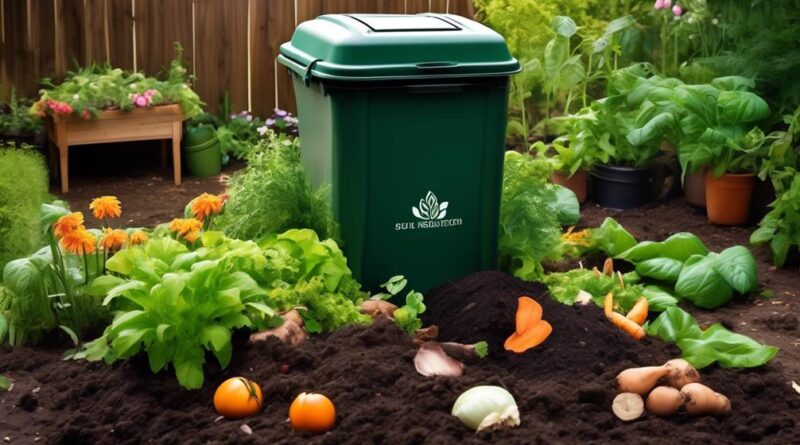What Are the Waste Reduction Advantages of Composting?
With the world's waste woes worsening, you may be wondering how to tackle the tremendous task of trash reduction. Composting could be the key to curbing this conundrum.
The waste reduction advantages of composting are not only numerous but also impactful. From reducing organic waste to minimizing greenhouse gas emissions, the benefits are bountiful.
But there's more to uncover about how composting can make a substantial difference in waste management and environmental preservation.
Reducing Organic Waste
To reduce organic waste, start by implementing a food waste recycling program in your household or workplace. By separating food waste from other trash, you can significantly decrease the amount of organic waste that ends up in landfills. Food waste recycling involves collecting food scraps and other organic materials and processing them into nutrient-rich compost. This not only reduces the volume of waste sent to landfills but also provides numerous environmental benefits.
Food waste recycling is a simple yet effective way to minimize the environmental impact of organic waste. When food waste decomposes in landfills, it produces methane, a potent greenhouse gas that contributes to climate change. By recycling food waste through composting, you can help mitigate these harmful environmental effects. Composting food waste also enriches the soil, reducing the need for chemical fertilizers and promoting healthier plant growth. This, in turn, supports biodiversity and the overall health of ecosystems.
In addition to environmental benefits, reducing food waste through composting can also save money and resources. By diverting food waste from landfills, you can lower waste management costs and potentially generate cost savings by using compost in gardening or landscaping. Ultimately, implementing a food waste recycling program not only reduces organic waste but also contributes to a more sustainable and environmentally friendly approach to waste management.
Decreasing Landfill Contributions
By diverting food waste from landfills through composting, you actively contribute to decreasing the overall volume of waste sent to landfill sites. This landfill diversion has significant environmental benefits, making it an essential aspect of sustainable waste management and community engagement.
Environmental Benefits of Landfill Diversion
- Reduced Methane Emissions: When organic waste decomposes in landfills, it produces methane, a potent greenhouse gas. Composting organic waste instead of sending it to landfills helps reduce these harmful emissions, mitigating the impact on climate change.
- Preservation of Landfill Space: Landfills are finite resources, and diverting food waste from them helps extend their lifespan. By reducing the volume of waste sent to landfills, composting helps conserve valuable land resources and minimizes the need for establishing new landfill sites.
- Enhanced Soil Health: Compost enriches the soil with essential nutrients, improving its structure and fertility. When organic waste is composted, it creates a valuable resource that can be used to enhance agricultural productivity and support sustainable land use practices.
Sustainable waste management practices, such as composting, not only benefit the environment but also foster community engagement. By actively participating in composting initiatives, individuals and communities play a crucial role in reducing their environmental footprint and contributing to a more sustainable future.
Minimizing Greenhouse Gas Emissions
Minimizing greenhouse gas emissions necessitates implementing effective composting strategies for organic waste management. When organic waste decomposes in landfills, it generates methane, a potent greenhouse gas that contributes to climate change. By diverting organic waste to composting facilities, you can significantly reduce methane emissions. Composting organic waste breaks down the materials in a controlled environment, reducing the release of methane into the atmosphere. This not only helps mitigate the impact on climate change but also improves soil fertility.
Composting plays a crucial role in reducing methane emissions, as it provides an oxygen-rich environment that promotes aerobic decomposition, which minimizes the production of methane. When organic waste is composted, the resulting compost can then be used to enrich soil, improving its structure and fertility. This enriched soil retains more moisture, reduces the need for chemical fertilizers, and promotes healthier plant growth. By incorporating compost into agricultural practices, you can enhance soil health and productivity while simultaneously reducing greenhouse gas emissions.
In addition to reducing methane emissions, composting also helps sequester carbon in the soil, further mitigating the impact of greenhouse gases. By embracing composting as a waste management strategy, you actively contribute to minimizing greenhouse gas emissions, while simultaneously reaping the benefits of improved soil fertility and sustainable agricultural practices.
Creating Nutrient-Rich Soil
When composting organic waste, you create nutrient-rich soil that benefits from the controlled breakdown of materials, promoting soil fertility and enhanced agricultural productivity. This enriched soil provides numerous advantages for agricultural practices, contributing to healthier plant growth and improved crop yields.
- Soil Enrichment: Composting enhances the nutrient content of the soil, providing essential elements such as nitrogen, phosphorus, and potassium. These nutrients are vital for plant growth and are slowly released into the soil, ensuring a steady supply for the crops.
- Improved Soil Structure: The organic matter in compost helps improve soil structure, making it more resistant to erosion and compaction. This allows for better water retention and aeration, creating an optimal environment for plant roots to thrive.
- Reduced Need for Chemical Fertilizers: By enriching the soil with compost, farmers can reduce their reliance on synthetic fertilizers. This not only saves costs but also minimizes the environmental impact associated with the excessive use of chemical fertilizers.
The agricultural benefits of composting extend beyond soil enrichment. It also plays a crucial role in promoting sustainable farming practices, reducing the dependency on external inputs, and contributing to the overall health of the ecosystem.
Therefore, embracing composting as a means of soil enrichment can significantly enhance agricultural productivity while fostering environmentally friendly farming methods.
Lowering Methane Production
To reduce methane production, actively incorporating organic waste into composting processes is a highly effective method. When organic waste such as food scraps and yard trimmings are sent to landfills, they decompose without oxygen, leading to the production of methane, a potent greenhouse gas. By composting these organic materials instead, you can significantly lower emissions of methane into the atmosphere.
Composting not only prevents the release of methane but also offers agricultural benefits. When compost is added to soil, it enhances its ability to retain moisture, improves soil structure, and promotes the growth of healthy plants. This nutrient-rich soil acts as a natural fertilizer, reducing the need for chemical fertilizers that can contribute to greenhouse gas emissions during their production.
Additionally, the organic matter in compost provides essential nutrients for plants, leading to increased crop yields and overall improved soil health.
Cutting Down on Waste Transportation
By incorporating composting into your waste management practices, you can significantly reduce the need for transporting organic waste to landfills. This reduction in waste transportation brings several key benefits to both the environment and your community.
- Local Composting: Composting allows for the organic waste to be processed locally, eliminating the need for long-distance transportation to landfills. This not only reduces the carbon emissions from transportation but also lessens the burden on existing landfill facilities.
- Waste Diversion: Instead of transporting organic waste to distant landfills, composting allows for the diversion of a significant portion of this waste away from the traditional waste management system. This diversion reduces the strain on landfill capacities and extends their operational lifespans.
- Community Impact: Through local composting and waste diversion, communities can take a more active role in managing their organic waste. This can lead to a greater sense of environmental responsibility and sustainability within the community.
Lessening Environmental Impact

As you consider the benefits of reducing waste transportation through composting, it's important to recognize the significant impact this has on lessening the environmental burden. By composting organic waste, you contribute to minimizing pollution and preserving resources, thus reducing the overall environmental impact.
When organic waste is transported to landfills, it decomposes anaerobically, producing methane, a potent greenhouse gas that contributes to climate change. However, by composting this waste instead, you prevent the production of methane, thereby reducing air pollution and lessening the greenhouse effect.
Moreover, composting organic waste helps in preserving resources. When organic matter is composted, it's returned to the soil as nutrient-rich humus, which enhances soil structure, promotes plant growth, and reduces the need for chemical fertilizers. As a result, the demand for synthetic fertilizers decreases, conserving natural resources and minimizing the environmental impact associated with their extraction and production.
Additionally, by composting organic waste, you reduce the volume of waste being sent to landfills, alleviating the pressure on these facilities and reducing the associated environmental burdens such as leachate production and land use. This, in turn, helps in safeguarding ecosystems and natural habitats from the detrimental effects of landfill pollution.
Promoting Sustainable Practices
Promote sustainability by engaging in composting practices that minimize waste and benefit the environment. Composting is a simple and effective way to reduce waste and promote sustainable practices in your community. By composting, you can actively contribute to sustainable agriculture and urban gardening efforts, while also reducing the amount of waste that goes to landfills.
Here's how composting can help promote sustainable practices:
- Enriching Soil: Compost is a nutrient-rich soil amendment that enhances soil quality, promotes healthy plant growth, and reduces the need for chemical fertilizers. By using compost in sustainable agriculture, you can improve soil fertility and support the growth of organic produce.
- Reducing Water Usage: Compost helps soil retain moisture, reducing the need for excessive watering. In urban gardening, where water resources may be limited, using compost can contribute to sustainable water management practices.
- Minimizing Waste: Composting diverts organic waste from landfills, where it would otherwise release methane, a potent greenhouse gas. By reducing waste through composting, you can contribute to a more sustainable waste management system and help mitigate environmental impacts.
Frequently Asked Questions
Can Composting Attract Pests and Cause Odors?
Composting can attract pests and cause odors if not managed properly. To prevent pests, use a secure compost bin and avoid adding meat or dairy. Control odors by ensuring proper aeration and adding carbon-rich materials like leaves or straw.
What Are the Best Materials to Use for Composting?
You can create rich compost by using food scraps, yard waste, newspaper, cardboard, wood chips, straw, sawdust, and coffee grounds. Incorporating worms in composting helps break down materials faster and adds valuable nutrients to the compost.
How Long Does It Take for Organic Waste to Turn Into Nutrient-Rich Soil Through Composting?
Organic waste transformation into nutrient-rich soil through composting takes about 2-5 months. You can speed up the process by regularly turning the compost and ensuring the right balance of green and brown materials for optimal nutrient-rich soil production.
Can Composting Be Done in an Urban Environment?
In an urban environment, composting faces challenges like limited space and odor control. However, community engagement and innovative composting solutions, like vermicomposting and Bokashi, make urban composting feasible and effective in reducing waste.
Are There Any Specific Regulations or Guidelines for Composting in Different Regions or Countries?
Regulatory requirements for composting vary by region and country, impacting environmental impact. It's crucial to research local guidelines on waste management and composting to ensure compliance and minimize negative environmental effects.
Conclusion
So, now that you know the waste reduction advantages of composting, you can see how easy it's to make a positive impact on the environment.
By reducing organic waste, decreasing landfill contributions, and creating nutrient-rich soil, you're contributing to a more sustainable future.
So, start composting today and be a part of the solution to minimize greenhouse gas emissions and lessen our environmental impact.
